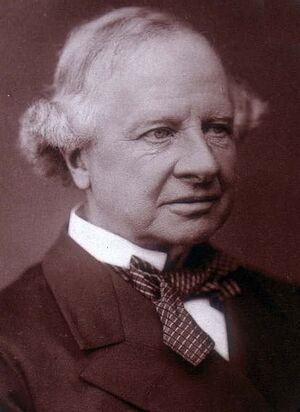Difference between revisions of "Granville Leveson-Gower"
(Eton) |
m (party tidy) |
||
| (3 intermediate revisions by 3 users not shown) | |||
| Line 1: | Line 1: | ||
{{person | {{person | ||
| − | |||
|alma_mater=Eton, Christ Church (Oxford) | |alma_mater=Eton, Christ Church (Oxford) | ||
| + | |wikipedia=https://en.wikipedia.org/wiki/Granville_Leveson-Gower,_2nd_Earl_Granville | ||
| + | |birth_date=11 May 1815 | ||
| + | |birth_place=London | ||
| + | |image=Second Earl Granville.jpg | ||
| + | |death_date=31 March 1891 | ||
| + | |death_place=London | ||
| + | |nationality=British | ||
| + | |political_parties=Liberal Party (UK) | ||
| + | |description=British Secretary of State who improved relations with the United States | ||
| + | |employment={{job | ||
| + | |title=Secretary of State for Foreign Affairs | ||
| + | |start=26 December 1851 | ||
| + | |end=27 February 1852 | ||
| + | }}{{job | ||
| + | |title=Secretary of State for Foreign Affairs | ||
| + | |start=6 July 1870 | ||
| + | |end=21 February 1874 | ||
| + | }}{{job | ||
| + | |title=Secretary of State for Foreign Affairs | ||
| + | |start=28 April 1880 | ||
| + | |end=24 June 1885 | ||
| + | }}{{job | ||
| + | |title=Lord President of the Council | ||
| + | |start=28 December 1852 | ||
| + | |end=12 June 1854 | ||
| + | }}{{job | ||
| + | |title=Lord President of the Council | ||
| + | |start=8 February 1855 | ||
| + | |end=26 February 1858 | ||
| + | }}{{job | ||
| + | |title=Lord President of the Council | ||
| + | |start=18 June 1859 | ||
| + | |end=6 July 1866 | ||
}} | }} | ||
| + | }} | ||
| + | |||
| + | '''Granville George Leveson-Gower, 2nd Earl Granville''', styled '''Lord Leveson''' until 1846, was a [[United Kingdom of Great Britain and Ireland|British]] [[Liberal Party (UK)|Liberal]] statesman<ref>https://en.wikisource.org/wiki/Dictionary_of_National_Biography,_1885-1900/Leveson-Gower,_Granville_George_(1815-1891)</ref> from the [[Leveson-Gower family]]. | ||
| + | |||
| + | In a political career spanning over 50 years, he was thrice [[Secretary of State for Foreign Affairs]], led the Liberal Party in the House of Lords for almost 30 years and was joint Leader of the Liberal Party between 1875 and 1880. He is best known for his pacific stewardship (apart from in the colonies) of Britain's external relations, 1870–74 and 1880–85, in co-operation with his best friend, Prime Minister [[William Ewart Gladstone]]. His foreign policy was based on patience, peace, and no alliances; it kept Britain free from European wars and improved relations with the United States after the failed British support to the Southern states' bid for secession during the [[American Civil War]]. | ||
{{SMWDocs}} | {{SMWDocs}} | ||
==References== | ==References== | ||
{{reflist}} | {{reflist}} | ||
| − | |||
Latest revision as of 22:03, 6 April 2024
 | |||||||||||||||||||||||||||||||||||||||||||
| Born | 11 May 1815 London | ||||||||||||||||||||||||||||||||||||||||||
| Died | 31 March 1891 (Age 75) London | ||||||||||||||||||||||||||||||||||||||||||
| Nationality | British | ||||||||||||||||||||||||||||||||||||||||||
| Alma mater | Eton, Christ Church (Oxford) | ||||||||||||||||||||||||||||||||||||||||||
| Party | Liberal Party (UK) | ||||||||||||||||||||||||||||||||||||||||||
British Secretary of State who improved relations with the United States
| |||||||||||||||||||||||||||||||||||||||||||
Granville George Leveson-Gower, 2nd Earl Granville, styled Lord Leveson until 1846, was a British Liberal statesman[1] from the Leveson-Gower family.
In a political career spanning over 50 years, he was thrice Secretary of State for Foreign Affairs, led the Liberal Party in the House of Lords for almost 30 years and was joint Leader of the Liberal Party between 1875 and 1880. He is best known for his pacific stewardship (apart from in the colonies) of Britain's external relations, 1870–74 and 1880–85, in co-operation with his best friend, Prime Minister William Ewart Gladstone. His foreign policy was based on patience, peace, and no alliances; it kept Britain free from European wars and improved relations with the United States after the failed British support to the Southern states' bid for secession during the American Civil War.